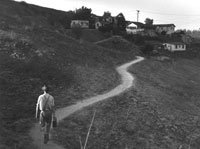
Closed Captioned
Grades Grades 4 to 12, College, Adult
Directed by Jordan Mechner
DVD Purchase $195, Rent $45
US Release Date: 2005
Copyright Date: 2004
DVD ISBN: 1-59458-246-7
VHS ISBN: 1-59458-245-9
Subjects
American Democracy
American Studies
Anthropology
Art/Architecture
California History
Community
Economics
Geography
History
Humanities
Latino and Chicano Studies
Low Income Housing
Multicultural Studies
Photography
Race and Racism
Social Psychology
Sociology
Urban Studies
Urban and Regional Planning
Western US
Awards and Festivals
Short-listed for Best Documentary Short, Academy Awards®
National PBS Broadcast on "Independent Lens"
Best Short Documentary, International Documentary Association Awards
Gold Plaque, Chicago International Television Awards
Grand Jury Award for Best Documentary Short, Florida Film Festival
Unique Award, Society for Visual Anthropology Film & Video Festival
Honorable Mention, Columbus International Film & Video Festival
Award for Community History, Visual Anthropology Film Festival
American Sociological Association's Annual Meeting Film/Video Screenings
Margaret Mead Film Festival
Full Frame Documentary Film Festival
InFact Documentary Theatrical Showcase
Tribeca Film Festival
AFI Film Festival
Kodak DocuFest
IFP Market
Hot Springs Documentary Film Festival
Vermont International Film Festival
United Nations Association Film Festival, Stanford
Silver Lake Film Festival
Artivist Film Festival
Hazel Wolf Environmental Film Festival
Roxbury Film Festival
Fact vs. Fiction Film Festival
Cine Las Americas, Austin
National Association for Multicultural Education Conference
Eau Claire Progressive Film Festival
Architecture & Design Film Festival
A Los Angeles Story
Don Normark's haunting photographs bring back to life a Mexican American village razed in the 1950s to build Dodger Stadium.
 |
"Heartfelt... well-shot and sharply edited" Microcinema Scene |
CHAVEZ RAVINE tells the bittersweet story of how an American community was betrayed by greed, political hypocrisy, and good intentions gone astray.
In 1949, photographer Don Normark stumbled on Chávez Ravine, a closely-knit Mexican-American village on a hill overlooking downtown Los Angeles. Enchanted, he stayed for a year and took hundreds of photographs, never knowing he was capturing on film the last images of a place that was about to disappear.
The following year, the city of L.A. evicted the 300 families of Chávez Ravine to make way for a low-income public housing project. The land was cleared, homes, schools, and church razed to the ground. But the real estate lobby, sensing a great opportunity, accused the LA Housing Authority's Frank Wilkinson of being a communist agent. The city folded and instead of building the promised housing, it sold the land to baseball owner Walter O'Malley, who built Dodger Stadium on the site.
Fifty years later, Normark's haunting black-and-white photographs reclaim and celebrate a lost village from a simpler time.
Reviews
"Heartfelt... well-shot and sharply edited... it's Mechner's sense of people and place, more than moral outrage, that makes his work compelling. ***"
"This bittersweet tale recounts a lost village, Dodger Stadium, and the miraculous moment of time that lay between them."
"Powerful and moving... a gripping revival of the forgotten history behind the land which today holds L.A. Dodger Stadium."
"Using historic photographs of the families as well as contemporary interviews -- and with a surprising twist -- Mechner tells a cautionary story of community, deception, and loss."
"Chavez Ravine is a unique and fascinating contribution to the unknown history of Latino people in California. It relates beautifully to every dislocated community; it connects in a surprising and important way to the McCarthy Era; it is composed of oral history and historic photographs, woven seamlessly with a beautiful score and narrative. I cannot recommend it highly enough to all teachers because it shows the relevance and power of history for all. My own students raved about it."
"Chavez Ravine is a poignant and painful look at race, politics, and displacement in Los Angeles. This documentary tells the story of Mexican communities that were removed first by City Hall and then, by the L.A. Dodgers. The film, though, also tells a story of memory and resistance as the publication of old photographs brings people together and in some ways keeps the communities of Chavez Ravine alive. This film would be ideal for courses dealing with communities of color, urban politics, race, and the politics of memory."
"Chavez Ravine is an important work of historical recovery that visually retrieves a strand in the lost history of Los Angeles. It is a beautifully produced account of the human costs of urban displacement and of the complexities of urban politics."
"The villages are gone, they survive only in memory, and in this wonderful...film...Highly recommended."
"A fascinating assembly of Normark's photographs of a community lost in time and mind...Highly recommended."
"An eerie foreshadowing of today's 'eminent domain' debate about the use of private property for the public good...this revelation of a shameful episode in Los Angeles history is illustrated with the hauntingly evocative pictures of acclaimed photographer Don Normark...recommended."